九江市的英文简介PPT
- 格式:ppt
- 大小:3.11 MB
- 文档页数:16
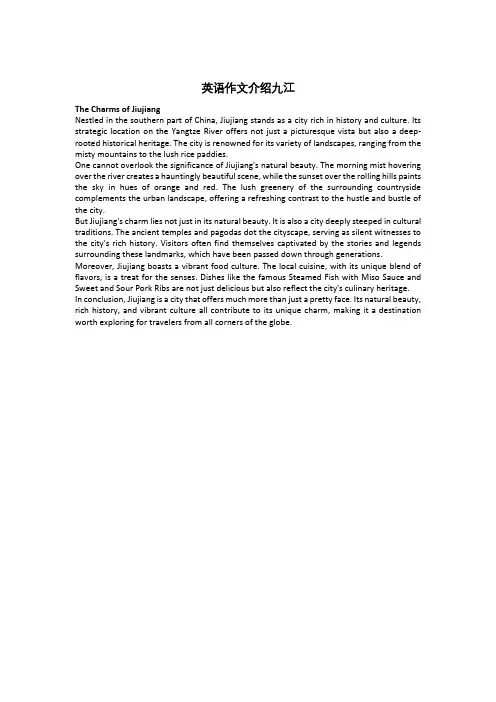
英语作文介绍九江The Charms of JiujiangNestled in the southern part of China, Jiujiang stands as a city rich in history and culture. Its strategic location on the Yangtze River offers not just a picturesque vista but also a deep-rooted historical heritage. The city is renowned for its variety of landscapes, ranging from the misty mountains to the lush rice paddies.One cannot overlook the significance of Jiujiang's natural beauty. The morning mist hovering over the river creates a hauntingly beautiful scene, while the sunset over the rolling hills paints the sky in hues of orange and red. The lush greenery of the surrounding countryside complements the urban landscape, offering a refreshing contrast to the hustle and bustle of the city.But Jiujiang's charm lies not just in its natural beauty. It is also a city deeply steeped in cultural traditions. The ancient temples and pagodas dot the cityscape, serving as silent witnesses to the city's rich history. Visitors often find themselves captivated by the stories and legends surrounding these landmarks, which have been passed down through generations. Moreover, Jiujiang boasts a vibrant food culture. The local cuisine, with its unique blend of flavors, is a treat for the senses. Dishes like the famous Steamed Fish with Miso Sauce and Sweet and Sour Pork Ribs are not just delicious but also reflect the city's culinary heritage.In conclusion, Jiujiang is a city that offers much more than just a pretty face. Its natural beauty, rich history, and vibrant culture all contribute to its unique charm, making it a destination worth exploring for travelers from all corners of the globe.。

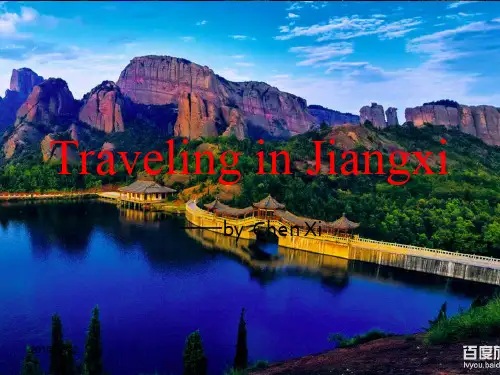
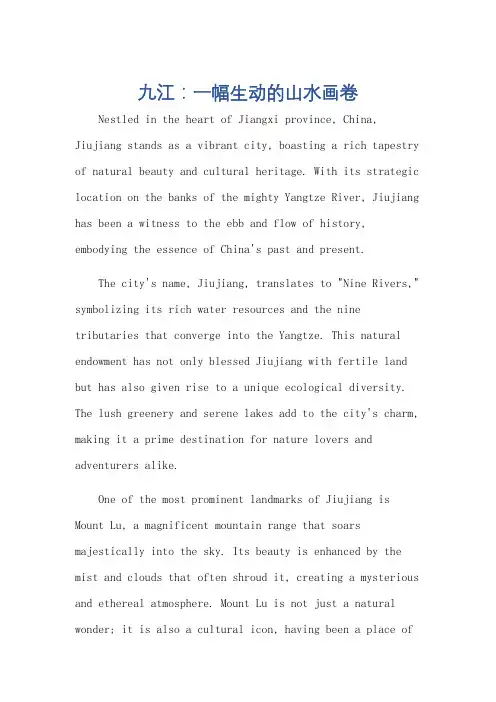
九江:一幅生动的山水画卷Nestled in the heart of Jiangxi province, China, Jiujiang stands as a vibrant city, boasting a rich tapestry of natural beauty and cultural heritage. With its strategic location on the banks of the mighty Yangtze River, Jiujiang has been a witness to the ebb and flow of history, embodying the essence of China's past and present.The city's name, Jiujiang, translates to "Nine Rivers," symbolizing its rich water resources and the ninetributaries that converge into the Yangtze. This natural endowment has not only blessed Jiujiang with fertile land but has also given rise to a unique ecological diversity. The lush greenery and serene lakes add to the city's charm, making it a prime destination for nature lovers and adventurers alike.One of the most prominent landmarks of Jiujiang is Mount Lu, a magnificent mountain range that soars majestically into the sky. Its beauty is enhanced by the mist and clouds that often shroud it, creating a mysterious and ethereal atmosphere. Mount Lu is not just a natural wonder; it is also a cultural icon, having been a place ofpilgrimage for many Chinese scholars and poets throughout history.Jiujiang's cultural heritage is further reflected inits ancient temples and pagodas. These architectural wonders, with their intricate carvings and elegant designs, are not just testaments to the city's rich history but also serve as platforms for religious and cultural exchanges. The bustling marketplaces and vibrant festivals further enrich the cultural landscape of the city, offering a glimpse into the daily lives of its inhabitants.The city's cuisine is another highlight, with a blend of local flavors and influences from neighboring regions. Dishes like steamed fish, tofu skin, and sweet-and-sour pork are just a few examples of the delicious treats that Jiujiang has to offer. These dishes, served in the city's numerous restaurants and street food stalls, are not just a delight to the taste buds but also a window into the city's culinary traditions and cultural identity.In conclusion, Jiujiang is a city that offers a perfect blend of natural beauty, cultural heritage, and culinary delights. Its strategic location, rich resources, andvibrant culture have made it a destination that is worth exploring and experiencing. From its majestic mountains and serene lakes to its ancient temples and bustling marketplaces, Jiujiang is truly a city that embodies the essence of China.**九江:生动的山水画卷**九江,这座位于江西省中心的城市,以其丰富的自然美景和文化遗产而著称。
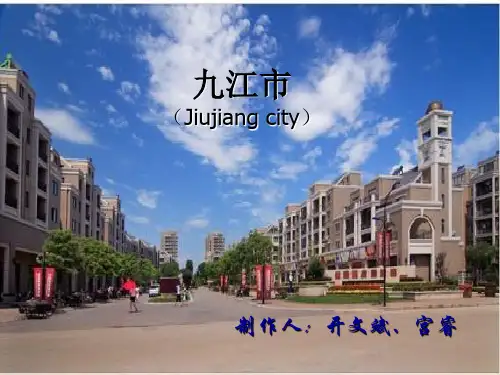
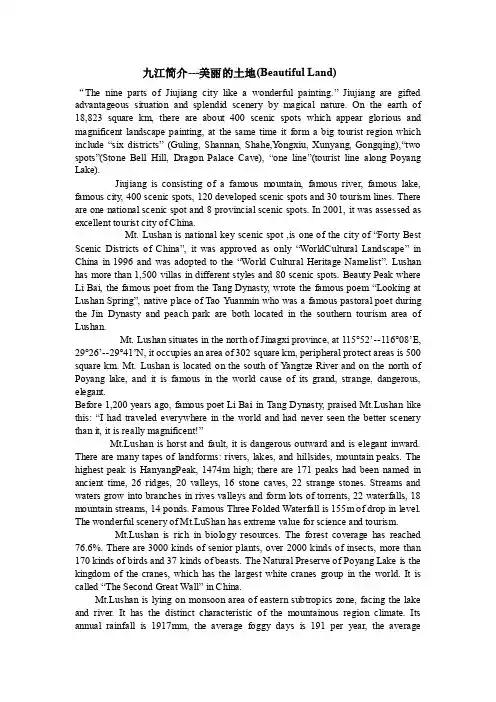
九江简介---美丽的土地(Beautiful Land)“The nine parts of Jiujiang city like a wonderful painting.” Jiujiang are gifted advantageous situation and splendid scenery by magical nature. On the earth of 18,823 square km, there are about 400 scenic spots which appear glorious and magnificent landscape painting, at the same time it form a big tourist region which include “six districts” (Guling, Shannan, Shahe,Y ongxiu, Xunyang, Gongqing),“two spots”(Stone Bell Hill, Dragon Palace Cave), “one line”(tourist line along Poyang Lake).Jiujiang is consisting of a famous mountain, famous river, famous lake, famous city, 400 scenic spots, 120 developed scenic spots and 30 tourism lines. There are one national scenic spot and 8 provincial scenic spots. In 2001, it was assessed as excellent tourist city of China.Mt. Lushan is national key scenic spot ,is one of the city of “Forty Best Scenic Districts of China”, it was approved as only “WorldCultural Landscape” in China in 1996 and was adopted to the “World Cultural Heritage Namelist”. Lushan has more than 1,500 villas in different styles and 80 scenic spots. Beauty Peak where Li Bai, the famous poet from the Tang Dynasty, wrote the famous poem “Looking at Lushan Spring”, native place of Tao Yuanmin who was a famou s pastoral poet during the Jin Dynasty and peach park are both located in the southern tourism area of Lushan.Mt. Lushan situates in the north of Jinagxi province, at 115°52’--116°08’E, 29°26’--29°41’N, it occupies an area of 302 square km, peri pheral protect areas is 500 square km. Mt. Lushan is located on the south of Y angtze River and on the north of Poyang lake, and it is famous in the world cause of its grand, strange, dangerous, elegant.Before 1,200 years ago, famous poet Li Bai in Tang Dynasty, praised Mt.Lushan like this: “I had traveled everywhere in the world and had never seen the better scenery than it, it is really magnificent!”Mt.Lushan is horst and fault, it is dangerous outward and is elegant inward. There are many tapes of landforms: rivers, lakes, and hillsides, mountain peaks. The highest peak is HanyangPeak, 1474m high; there are 171 peaks had been named in ancient time, 26 ridges, 20 valleys, 16 stone caves, 22 strange stones. Streams and waters grow into branches in rives valleys and form lots of torrents, 22 waterfalls, 18 mountain streams, 14 ponds. Famous Three Folded Waterfall is 155m of drop in level. The wonderful scenery of Mt.LuShan has extreme value for science and tourism.Mt.Lushan is rich in biology resources. The forest coverage has reached 76.6%. There are 3000 kinds of senior plants, over 2000 kinds of insects, more than 170 kinds of birds and 37 kinds of beasts. The Natural Preserve of Poyang Lake is the kingdom of the cranes, which has the largest white cranes group in the world. It is called “The Second Great Wall” in China.Mt.Lushan is lying on monsoon area of eastern subtropics zone, facing the lake and river. It has the distinct characteristic of the mountainous region climate. Its annual rainfall is 1917mm, the average foggy days is 191 per year, the averagerelative humidity is 78% per year, annual temperature is 16.9℃during July to September, the highest temperature in summer is 32℃. The good climate and beautiful natural environment make Mt.Lushan become the famous summer resort.6000 years ago, there were human beings living and working in Mt.Lushan. For a long time, people created rich and profound and far-reaching culture of Mt.Lushan.The name of Mt.Lushan originated from the records of Yugong and Shanhai Classic. In 126 BC, Sima Qian climbed Mt.Lushan from south and recorded “Mt.Lushan” into “Records of the Historian”. In its history, Tao Yuanming, Xie Lingyun, Zong Bing, Li Bai, Bai Juyi, Su Shi, Wang Anshi, Huang Tingjian, Luyou, Kang Y ouwei, Chen Sanli, Hu Shi, Xu Zhimo, Guo Moruo and other famous men (near 1500 poets) of arts or poetry came to Mt. Lushan and wrote 4000 poems and left countless poems and prose.Mt.Lushan is a place of religion in China. In the East Jin Dynasty, Huiyuan, a famous monk, founded the DonglinTemple. The honorific title for a Buddhist monk named Zhu Daosheng created the theory of suddenly realized the truth in Mt.Lushan. Zhang Daoling practiced Taoism in Mt.Lushan. Another famous Taoist by name of Lu Xiujing founded the Taoist temple Jianji. From 4 century AD to 13 century AD, temples were built in a numerous number and Buddhist temples and Taoist temples amounted to more than 500. In 1942, the World Buddhism Association Conference is held in Mt.Lushan. In early this century, westerners came and built churches in the mountain. Now, you still can see the religions of Buddhism, Taoism, Islamism, Catholicism, and Christianity.BaiLudongAcademy白鹿洞书院was built in 940 AD. Zhuxi朱熹, the great educator of the South Song Dynasty, turned the place into BailudongAcademy, which rivaled the other three famous academies. Zhou Dunyi周敦颐who loved lotus also opened the LianxiAcademy under the LianyiPeak.Mt.Lushan hot spring had been a famous medical hot spring in the Jin Dynasty. Lushan Gulian Spring was called “The First Spring under heaven-unequalled” by Luyu (the Tea Master in the Tang Dynasty). Mt.LushanGuanyinBridge观音桥was built in 1014, the arch is made of granite stones and the arch bridge is still standing in good condition. After 16 century AD, a specialist in material medical Li Shizhen, geography specialist Xu Xiake徐霞客, and Wu Qi吴起who created the beginning of the Chinese Flora went to Mt.Lushan to make scientific investigation one after another. In the 1930’s, the famous geology specialist Li Siguang李四光discovered the Forth Glacier Epoch historical remains in China before all others, and created the Forth Glacier Epoch Theory. Hu Xianxiao胡先啸(one of the Chinese botany founders) opened the first regular botanical garden of China-LushanBotanical Garden.Mt.Lushan is an interest, which has both the rich culture background and the beautiful natural scenery. From late 19th century to early 20th century, there were over 1,000 villas in Mt.Lushan built by people from 18 countries, including the English, the Americans, the Frenchmen, the Russians and so on. During the period of the People’s Repulic, Kiang Kaishek chose Lushan as his summer capital.In 1937, Zhou Enlai had a conference with Kiang Kaishek on behalf of CPC in Mt.Lushan. Then made the first speech on Anti-Japanese. After the People’s Republic of Chinawas founded, Chairman Mao Zedong came to Mt.Lushan and held three important conferences of the Central Committee of the Chinese Communist Party.The natural beautiful scenery of Mt Lushan gave birth to historical culture. The natural scenes and historical sites add to each other’s beauty, which reflects the unique charm of Mt Lushan as a famous mount in the world.On December 6, 1996, the United Nations Educational, Scientific and Cultural Organization included Mt. Lushan as World Cultural View in the World Heritage Namelist and gave the following remark: “with its peculiar style i n historic remains, which is melted with remarkable natural beauty, Mt. Lushan has formed a highly-esthetically-valued cultural view closely relevant to the spirit of the Chinese people and their cultural life!”The scenic spots of urban district are JiujiangYangtze RiverBridge九江长江大桥, Y angtze River Dike Square抗洪广场, Zhouyu’s Dianjiang Platform周瑜点将台Y anshui (Mist and Water) Pavilion烟水亭, Pipa Pavilion琵琶亭which is named after the Song of Pipa and XunyangTower where Songjiang wrote the poetry rebel against the imperial government. GantangLake and Nanmen lakes in the center of the city which has a area of about 1.2 million square kilometers. Ligong Dike李公堤between the two lakes was built by Libo (the prefect of Jiangzhou ) in Tang Dynasty.The major scenic spots of the county areas include the Tomb of Tao Yuanming陶渊明(a pastoral poet in the Eastern Jin Dynasty) and his temple, the Tomb of Yuefei’s mother, Yuefei岳飞was a national hero in the Song Dynasty), Stone Bell Hill which many military strategists tried to capture and control, Zhenru temple in Yunju Hill, Dragon Palace Cave龙宫洞which is more than 2700 meters long, and Zhelin Reservoir which is called “the lake of myriad islands”.The Y angtze River which comes from the Qinghai-Tibet Plateau is the third river in world and the biggest river in China. The river is developing big and strong. It is coming vast and misty. The surface of the river in the area of Jiujiang is very expansive, which is called XunyangRiver in the old time. The river bank has a n enchanting scene, rich natural resources and outstanding people and cultural land. There are many touching stories in history: Yushu climbed the Mt. Lushan, Guanying sunk in Langjing浪井(Rippling Well), Zhouyu assigned his men battle positions in Gantang, Dongfeng helped the common people in apricot forest, Tao Yuanming planted the beans under the Nan Hill, Bai Juyi白居易sighed with emotion of Pipa at the river bank, Libai enjoyed beautiful view at the Wulao (Five-Elders) Ridge五老峰, Su Dongpo苏东坡visited Stone Bell石钟山under moonlight……With the billowing Y angtze River flows to the east, the waves witnesses the remarkable people through the ages one by one.The PoyangLake is located in the north of JiangxiProvince, on the south bank of Y angtze River, between Jiujiang and Nanchang. Its north is Y angtze River and its west is Mt.Lushan. The vast and misty PoyangLake is connected with the blue sky. Under the brilliant sunshine, boats are going to the lake and birds are flying happily. In the rainy day, the water and cloud are boundless and indistinct, the wind and waves are highest. The morning sunlight and the evening sun is a scene majestic in all its variety. Wang Bo of Tang Dynasty wrote Tengwang Pavilion Poetry preface: “the fallingsunset clouds and the lonely bird are flying together, the autumn water and the sky in same color”. It described the scenery of the PoyangLake.The PoyangLake with GangjiangRiver, Fu River, XiuRiver, RaoRiver are flowing together into Y angtze River. The PoyangLake is a vast expanse of misty, rolling waters. It is the biggest freshwater lake. It is famous, because it is rich of fish and rice, convenient boat, beautiful scenery. The view of the mountain and river is wonderful. Stone Bell Hill, Shoe Hill, Fallen-Star Mound, Jun Hill, Yin Hill and Shoulder pole Hill face to face divided by the lake.Due to the geography and the climate condition are fit for migrant birds to pass the winter, so every winter there are thousands of migrant birds from the different areas to pass the winter here (From late Autumn to early Winter). Many migrant birds from Siberia, Mongolia, Japan, Korea, Northeast China, Northwest China come her to pass Winter and left during March. Now, there are more than 200 kinds of birds in the Natural Preserve of Poyang Lake including more than 20 kinds of well-know rare birds. It is the biggest bird Natural Preserve in the world. It is called “the Second Great Wall in China” by the foreign visitors.。
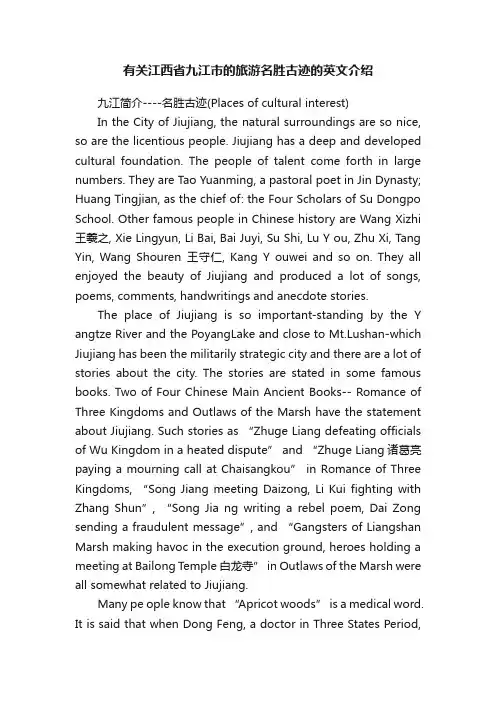
有关江西省九江市的旅游名胜古迹的英文介绍九江简介----名胜古迹(Places of cultural interest)In the City of Jiujiang, the natural surroundings are so nice, so are the licentious people. Jiujiang has a deep and developed cultural foundation. The people of talent come forth in large numbers. They are Tao Yuanming, a pastoral poet in Jin Dynasty; Huang Tingjian, as the chief of: the Four Scholars of Su Dongpo School. Other famous people in Chinese history are Wang Xizhi 王羲之, Xie Lingyun, Li Bai, Bai Juyi, Su Shi, Lu Y ou, Zhu Xi, Tang Yin, Wang Shouren王守仁, Kang Y ouwei and so on. They all enjoyed the beauty of Jiujiang and produced a lot of songs, poems, comments, handwritings and anecdote stories.The place of Jiujiang is so important-standing by the Y angtze River and the PoyangLake and close to Mt.Lushan-which Jiujiang has been the militarily strategic city and there are a lot of stories about the city. The stories are stated in some famous books. Two of Four Chinese Main Ancient Books-- Romance of Three Kingdoms and Outlaws of the Marsh have the statement about Jiujiang. Such stories as “Zhuge Liang defeating officials of Wu Kingdom in a heated dispute” and “Zhuge Liang诸葛亮paying a mourning call at Chaisangkou” in R omance of Three Kingdoms, “Song Jiang meeting Daizong, Li Kui fighting with Zhang Shun”, “Song Jia ng writing a rebel poem, Dai Zong sending a fraudulent message”, and “Gangsters of Liangshan Marsh making havoc in the execution ground, heroes holding a meeting at Bailong Temple 白龙寺” in Outlaws of the Marsh were all somewhat related to Jiujiang.Many pe ople know that “Apricot woods” is a medical word. It is said that when Dong Feng, a doctor in Three States Period,visited Mt.Lushan and he liked the beauty of Mt.Lushan. So he lived here to self-improve and cures the patients at the same time. Dong Feng was a kind-hearted doctor who cures the patients without any payment. He just asked the patients to plant one apricot tree if the patients were not serious and five apricot trees if they were very serious after they recovered. So many patients came to see the doctor and a lot of trees were planted there, then the apricot woods came into being. The story about Dong Feng and the apricot woods has been told from generation to generation.Tao Yuanming (365-427), a poet in Dongjin Dynasty, also called Yuanliang and Mr. Wuliu and Qian when he was old, was a native people of JiujiangCity. We all respected his spirit that he wouldn’t bend his waist for the salary from t he government at that time. His essay The Spring of the Blossom Flowers桃花源记provided the ideal world for the people and the highest chasing of the intellectuals, especially for “As I pick chrysanthemums beneath the eastern fence, my eyes fall leisurely on the Southern Mountain”. He was called pastoral poet because of his hones t feeling and natural style in his essays.Huang Tingjian (1045-1105), also called Luzhi, was a poet and paintist in North Song Dynasty, one of the Sudongpo Scholars who is from XiushuiCounty. He createdJiangxiPoemSchool and good at handwriting.BaiLudongAcademy is one of the most famous academies in Chinese history. In (937-942), it was a school for some famous people reading there. In the Song Dynasty, BaiLudongAcademy was set up. In 1179, Zhu Xi, an educator, came here as a prefect of Nankang military prefecture and then decided to rebuild the academy. After his hard management, A lot of people would liketo visit and study. The BaiLudongAcademy is the first of four famous academies (YueluAcademy, ShiguAcademy, JuyangAcademy) and named as one of the best academies at home and abroad.Ancient people created the wonderful culture for the City, and their followers are also creating the wonder. Since 1980s, the filmmakers such as Bi Bicheng and Wang Yimin who produced the famous films The Love Story on Mt. Lushan and The Feeling of Hometown have been going all out to make out the best films. The Love Story On Mt. Lushan and The Feeling of Hometown were awarded “Hundred Flowers Prize”, The Sound of Hometown was awarded “Golden Chick Prize”. Qualified films are being produced so that the Ci ty was named “the hometown of film” by Wenxue.。

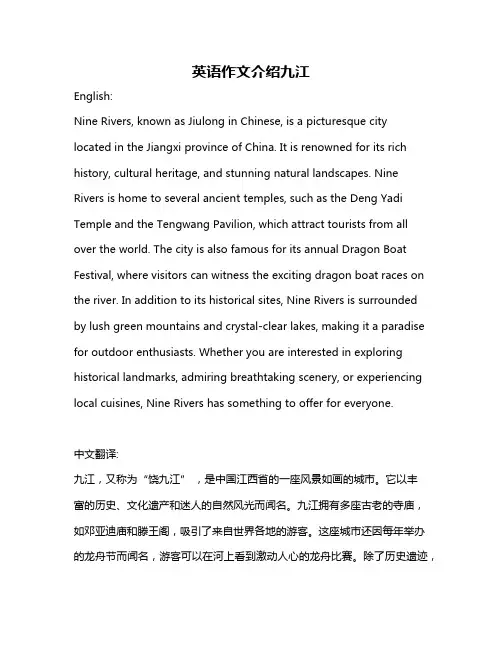
英语作文介绍九江English:Nine Rivers, known as Jiulong in Chinese, is a picturesque city located in the Jiangxi province of China. It is renowned for its rich history, cultural heritage, and stunning natural landscapes. Nine Rivers is home to several ancient temples, such as the Deng Yadi Temple and the Tengwang Pavilion, which attract tourists from all over the world. The city is also famous for its annual Dragon Boat Festival, where visitors can witness the exciting dragon boat races on the river. In addition to its historical sites, Nine Rivers is surrounded by lush green mountains and crystal-clear lakes, making it a paradise for outdoor enthusiasts. Whether you are interested in exploring historical landmarks, admiring breathtaking scenery, or experiencing local cuisines, Nine Rivers has something to offer for everyone.中文翻译:九江,又称为“饶九江” ,是中国江西省的一座风景如画的城市。

自我介绍九江英语Self-Introduction Jiujiang EnglishI am thrilled to have the opportunity to introduce myself and share my journey with Jiujiang English. As someone who has always been passionate about language and communication, I have found immense fulfillment in my role as an English educator in this vibrant city.My name is [Your Name], and I hail from [Your Country/Region]. From a young age, I was captivated by the power of words and the ability to connect with people from diverse backgrounds through the universal language of English. This fascination led me to pursue a degree in [Your Degree/Major], where I delved deeper into the intricacies of the English language, its history, and its global influence.After completing my studies, I felt a strong desire to share my knowledge and love for English with others. It was then that I discovered the remarkable city of Jiujiang and the thriving Englishlanguage community here. I was immediately drawn to the city's rich cultural heritage, the warmth of its people, and the growing demand for quality English education.Joining the Jiujiang English team has been a truly transformative experience for me. As an educator, I have had the privilege of working with students from all walks of life, each with their own unique aspirations and learning needs. Whether it's guiding young learners through the fundamentals of the language or helping professionals enhance their communication skills, I am constantly inspired by the dedication and enthusiasm of my students.One of the aspects I most enjoy about teaching in Jiujiang is the opportunity to tailor my approach to the specific needs of the community. I have found that the local culture and traditions have a profound impact on the way students perceive and engage with the English language. By incorporating elements of Jiujiang's rich heritage into my lessons, I am able to create a learning environment that is not only engaging but also deeply relevant to my students' lives.Moreover, the collaborative nature of the Jiujiang English team has been instrumental in my growth as an educator. I am constantly learning from my colleagues, who bring a diverse range of experiences and perspectives to the table. Together, we worktirelessly to develop innovative teaching methods, create engaging learning materials, and foster a supportive and inclusive community for our students.One of the proudest moments in my journey with Jiujiang English was the opportunity to organize and lead a cultural exchange program. This initiative brought together students from Jiujiang and their counterparts from around the world, allowing them to share their unique cultural traditions, explore the similarities and differences in their respective languages, and forge lasting friendships. Witnessing the joy and excitement on the faces of our participants as they immersed themselves in this cultural exchange was truly a humbling and rewarding experience.Beyond the classroom, I have also had the privilege of being involved in various community outreach programs. From volunteering at local schools to collaborating with community centers, I have had the opportunity to share my passion for English and contribute to the overall development of the Jiujiang community. These experiences have not only deepened my connection with the city but have also reinforced my belief in the transformative power of education.As I reflect on my time with Jiujiang English, I am filled with a deep sense of gratitude and pride. The support and guidance I have received from my colleagues, the trust and enthusiasm of mystudents, and the warmth of the Jiujiang community have all played a vital role in shaping my journey as an educator.Looking ahead, I am excited to continue growing and learning alongside the Jiujiang English team. I am committed to staying at the forefront of educational innovation, exploring new teaching methodologies, and incorporating the latest advancements in language learning technology. My goal is to not only help my students achieve their language learning goals but to also inspire them to become lifelong learners and global citizens.In conclusion, my experience with Jiujiang English has been truly transformative, both professionally and personally. I am honored to be a part of this dynamic and vibrant community, and I look forward to many more years of enriching experiences, meaningful connections, and continued growth. Thank you for the opportunity to share my story, and I look forward to the exciting journey that lies ahead.。
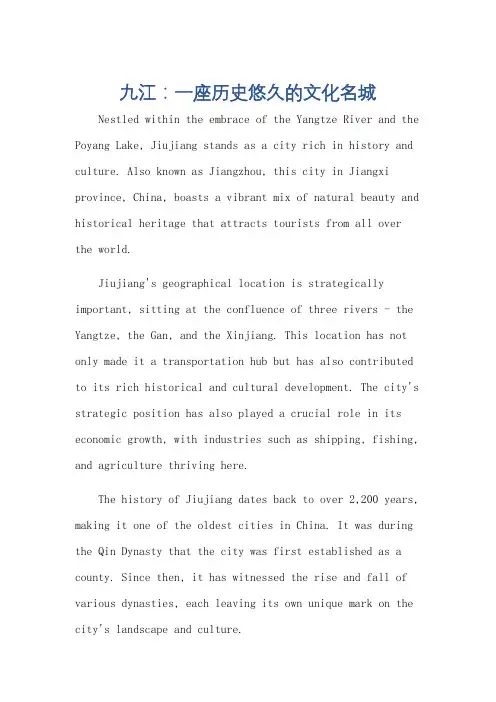
九江:一座历史悠久的文化名城Nestled within the embrace of the Yangtze River and the Poyang Lake, Jiujiang stands as a city rich in history and culture. Also known as Jiangzhou, this city in Jiangxi province, China, boasts a vibrant mix of natural beauty and historical heritage that attracts tourists from all over the world.Jiujiang's geographical location is strategically important, sitting at the confluence of three rivers - the Yangtze, the Gan, and the Xinjiang. This location has not only made it a transportation hub but has also contributed to its rich historical and cultural development. The city's strategic position has also played a crucial role in its economic growth, with industries such as shipping, fishing, and agriculture thriving here.The history of Jiujiang dates back to over 2,200 years, making it one of the oldest cities in China. It was during the Qin Dynasty that the city was first established as a county. Since then, it has witnessed the rise and fall of various dynasties, each leaving its own unique mark on the city's landscape and culture.One of the most著名 landmarks of Jiujiang is the Lushan Mountain, a UNESCO World Heritage site that offers breathtaking views of the surrounding countryside. The mountain is also famous for its unique geological features and rich biodiversity, attracting geologists and nature lovers from all over the world.The city is also renowned for its literary and artistic traditions. Many famous poets and writers, such as Wang Bo and Du Fu, have found inspiration in Jiujiang's natural beauty and rich cultural heritage. Their works have further enriched the city's literary and artistic heritage, making it a must-visit destination for lovers of Chineseliterature and art.In addition to its cultural attractions, Jiujiang also boasts a vibrant food culture. The local cuisine, known as Jiangxi cuisine, is renowned for its use of fresh ingredients and unique cooking techniques. Dishes such as the steamed fish with chili bean sauce and the double-boiled chicken with ginseng are just a few examples of the delicious delights that await food lovers in Jiujiang.The people of Jiujiang are also known for their friendliness and hospitality. They are proud of theircity's rich history and culture and are always eager to share it with visitors. The city's vibrant nightlife and bustling markets further add to the charm of this already captivating city.In conclusion, Jiujiang is a city that offers something for everyone. Whether you are interested in history and culture, nature and adventure, or simply want to enjoy the local cuisine and people's warmth, Jiujiang has plenty to offer. A visit to this city is sure to leave you with memories that will last a lifetime.**九江:一座历史悠久的文化名城**九江,这座位于长江与鄱阳湖怀抱中的城市,以其丰富的历史和文化而著称。
写一篇英语作文介绍九江Nestled in the heart of Jiangxi Province, Jiujiang emerges as a hidden gem, a city where the ancient meets the modern in a symphony of culture and nature. With its rich history dating back to the Neolithic Age, Jiujiang is a tapestry of stories woven through the ages, each thread a testament to the city's resilience and charm.The city's allure lies in its breathtaking landscapes, where the Yangtze River and Poyang Lake converge, creating a vista that is as serene as it is majestic. The waters of Jiujiang are not just a source of life but also a canvas for the region's vibrant biodiversity, with migratory birds flocking to its shores each year, painting the sky with their vibrant plumage.Jiujiang's cultural heritage is as diverse as its geography. The city is home to the Longtan Temple, a Buddhist sanctuary that stands as a beacon of spiritual tranquility amidst the bustling urban landscape. The ancient city walls, with their storied past, tell tales of battles won and lost, while the Jiujiang Museum offers a window into the region's past through its extensive collection of artifacts.For the culinary adventurers, Jiujiang is a paradise. The city's cuisine is a fusion of flavors, with dishes like Jiujiang duck and spicy river fish that tantalize the taste buds and leave a lasting impression. The local tea, known forits delicate aroma and rich flavor, is a must-try for those seeking a taste of the region's agricultural bounty.But Jiujiang is not just a city steeped in history; it is also a hub of innovation and progress. The city's commitment to sustainable development is evident in its eco-friendly policies and the thriving tech industry that is driving its economic growth.In essence, Jiujiang is a city that invites you to explore its depths, to wander through its streets and alleys, and to immerse yourself in its unique blend of the old and the new. It is a place where every corner holds a story, every view a memory, and every experience a lesson in the beauty of diversity.。
关于介绍九江的英语作文Title: Embracing the Beauty of JiujiangNestled in the heart of Jiangxi province, Jiujiang is a city that captivates with its natural splendor and rich cultural tapestry. This enchanting city stands at the confluence of the Yangtze River and the Gan River, creating a unique landscape that is both majestic and serene.Jiujiang boasts a landscape that is a painter's dream. Its rolling hills and verdant valleys are accented by ancient temples and pagodas, each with a story to tell. Mount Lushan, a UNESCO World Heritage Site, towers over the city, offering breathtaking views of the surrounding countryside. Its misty peaks and lush forests are a testament to the region's ecological diversity.The city's cultural heritage is as profound as its natural beauty. Jiujiang is home to numerous historical sites and museums that showcase the region's long and illustrious history. From ancient temples like the Deng Yadi Temple to the Tengwang Pavilion, these landmarks are not only places of worship but also repositories of cultural knowledge.The cuisine of Jiujiang is another attraction that draws food lovers from far and wide. Jiangxi-style dishes, with their unique blend of spiciness and freshness, are a culinary adventure that tantalizes the taste buds. From tender fish dishes to savory rice delicacies, each meal is a celebration of the region's agricultural bounty.Moreover, the people of Jiujiang are warm and welcoming, adding to the city's charm. Their friendliness and hospitality make visitors feel right at home, creating an atmosphere that is both relaxed and inviting.In conclusion, Jiujiang is a city that offers something for everyone. Whether you're a nature lover, a history buff, or a foodie, you'll find something to savor in this vibrant city. Come and embrace the beauty of Jiujiang, and let its magic transform your travel experience.。
My hometown九江英语说明文My hometown is in Jiujiang, where the scenery is beautiful, pleasant, rich in special products, is a beautiful and rich place.Lushan Mountain is located in the northern part of Jiangxi Province, to the south of the Yangtze River and northwest of the Poyang Lake. According to records, it has a history of more than 2,000 years. The scenic area, covering 302 square kilometers, houses 16 natural wonders, 474 scenic spots and 171 peaks, of which the highest peak, the Dahanyang Peak, is 1,474 meters above sea level.The scenery in Lushan Mountain scenic area is breathtaking. It is full of sheer peaks and precipices, changeable clouds and fogs, silver springs and flying waterfalls. The flora is diverse and comprises about 3,000 species. Features of glaciation during the Quaternary Period make Lushan Mountain even more mysterious. There are millions of migratory birds in the Poyang Lake area. The dancing of the largest number of cranes over the water makes it a world wonder.Jiujiang also has a lake, known as migratory birds, the poyang lake, the lake on the grass green, warmed by the distance, there is a fishing boat was coming slowly towards the shore,with the help of the grass growing at the end of the lake shore lake intertwined with white, figuring out the harmony of a blue and white movement, the distance on the grass, a few cows are leisurely stroll, cowboys behind cattle, Singing songs in his mouth, he walked happily to the front.Yantai PAVILION IS China's rare style of the most unique restoration pavilion, black tile, white wall, ancient wood carving Windows, a look can know a long history. Yanshui Pavilion was the place where Zhou Yu point general. It is in the northeast of Gantanghu Lake, need to pass a nine-winding bridge to reach the gate of Yanshui Pavilion. It is lined up like a museum with artifacts. I am standing on the platform of General Zhou Yu. Looking from here, you can certainly imagine the scene when Zhou Yu was ordering General Zhou Yu. On the platform, thousands of warships were waiting for his orders. It must have been quite a spectacle.My hometown is the place where I was born, although I left my hometown, I will always remember my hometown, I love my hometown.。
介绍九江的英语口语作文Nine River, located in the Jiangxi Province of China, is a beautiful city with a rich history and cultural heritage. Known for its stunning landscapes, Nine River is surrounded by mountains and rivers, making it a popular destination for nature lovers and outdoor enthusiasts.One of the must-visit attractions in Nine River is the Mount Lushan, a UNESCO World Heritage Site famous for its breathtaking scenery and ancient temples. Visitors can hike up the mountain, enjoy panoramic views of the surrounding area, and explore the historical sites scattered throughout the area.In addition to its natural beauty, Nine River is also home to a variety of cultural landmarks, such as the Porcelain Tower, a traditional Chinese pagoda with a history dating back centuries. The city's vibrant arts scene, delicious local cuisine, and friendly locals make it a welcoming and memorable place to visit.Whether you're interested in exploring historical sites, hiking in the mountains, or simply relaxing in a tranquil setting, Nine River has something to offer for everyone. With its unique blend of natural beauty andcultural attractions, Nine River is a hidden gem waiting to be discovered.中文翻译:九江位于中国江西省,是一个拥有丰富历史和文化遗产的美丽城市。
Title: Introducing the Charming City of Jiujiang, Jiangxi ProvinceNestled gracefully in the southern region of Jiangxi Province, China, Jiujiang stands as a beacon of rich cultural heritage and breathtaking natural beauty, attracting visitors from all corners of the world. This vibrant city offers a unique blend of history, stunning landscapes, delectable cuisine, and warm hospitality, making it a destination that promises an enchanting and unforgettable experience.Rich Cultural HeritageJiujiang boasts a long and fascinating history, dating back to the Neolithic period. It was once an important center of trade and commerce, serving as a hub for the Silk Road trade routes. Today, the city is home to numerous historical sites and relics, the most notable of which is the Yushan Pagoda, a national cultural heritage site. This exquisite pagoda, adorned with intricate carvings and exuding a serene atmosphere, serves as a testament to Jiujiang's profound Buddhist influence. Other significant landmarks include the Gantang Lake Ancient City Wall and the Yanshui Pavilion, each telling a unique story of the city's past.Stunning Natural LandscapesJiujiang's natural beauty is equally captivating. The city is situated on the southern bank of the Yangtze River and is surrounded by scenic mountains, with the magnificent Poyang Lake forming its backdrop. As the largest freshwater lake in China, Poyang Lake offers breathtaking views and a serene ambiance that invites visitors to take a leisurely boat ride and appreciate the harmony between nature and culture that Jiujiang embodies. Additionally, the Lushan Mountain Scenic Area, renowned for its "magnificent beauty unparalleled in the world," showcases sheer peaks, precipitous cliffs, changing clouds and fogs, as well as silver springs and majestic waterfalls.Delicious CuisineJiujiang's culinary scene is another highlight, featuring a unique blend of flavors influenced by the city's rich history and culture. Jiangxi-style dishes are renowned for their perfect balance of spiciness and freshness, offering a culinary adventure that satisfies even the most discerning palates. From tender and flavorful fish dishes sourced from the Poyang Lake to various rice delicacies, every meal in Jiujiang is a gastronomic delight. Moreover, local specialties like Lushan Cloud and Mist Tea, known as the "King of Rock Tea," and Ningzhou Congou Tea, a premium type of Chinese black tea, add to the city's reputation as a foodie's paradise.Warm Hospitality and Thriving EconomyJiujiang's people are renowned for their warmth and welcoming nature, making it easy for visitors to make new friends and immerse themselves in the local culture. The city's bustling nightlife and vibrant festivals further enhance the overall experience,providing ample opportunities to mingle with locals and understand their way of life. In recent years, Jiujiang has also experienced rapid economic development, becoming one of the most prosperous cities in China. Its thriving economy is fueled by a diverse range of industries, including electronics, machinery, food, and textiles, while itswell-connected transportation networks, including a high-speed railway, have further bolstered its growth.ConclusionIn conclusion, Jiujiang is a city that encapsulates the essence of China's rich cultural heritage, stunning natural beauty, delectable cuisine, and warm hospitality. Whether you are seeking a relaxing getaway or an adventure-packed trip, Jiujiang offers something for everyone. Visit this charming city and immerse yourself in its captivating landscapes, rich history, and vibrant culture. You will surely find a piece of heaven on earth that will linger in your memories for years to come.。
我的家乡江西九江英语作文My Hometown: Jiujiang, JiangxiNestled in the northern reaches of Jiangxi province, Jiujiang is a charming city that holds a special place in my heart. It's not just the place where I grew up, but also a land of rich history, beautiful landscapes, and delicious cuisine.One of the first things that strike visitors about Jiujiang is its natural beauty. The Yangtze River flows gracefully through the city, creating a unique waterfront landscape. The rolling hills and lush greenery surrounding the city offer a serene backdrop for exploration and relaxation.History is also deeply ingrained in Jiujiang. It is a city with a long and illustrious past, dating back to the ancient times. The ruins of ancient temples and fortresses stand as silent witnesses to the city's rich cultural heritage. Walking through the narrow alleys and ancient streets, one can almost hear the echoes of the past. But Jiujiang is not just about history and nature. The city is also renowned for its cuisine. Local dishes like Jiangxi rice noodles, tofu fish, and smoked goose are delicious and unique, often drawing visitors from far and wide. Dining in Jiujiang is an experience that one should not miss.As a native of Jiujiang, I am proud of my hometown. I cherish the memories of growing up here, playing in the fields and exploring the city's hidden gems. Jiujiang has shaped who I am and continues to inspire me in my daily life.In conclusion, Jiujiang is a city that offers a unique blend of history, nature, and culture. It is a place where tradition meets modernity, and where visitors can immerse themselves in the local way of life. For me, Jiujiang is not just a city; it is a home that I carry in my heart.。